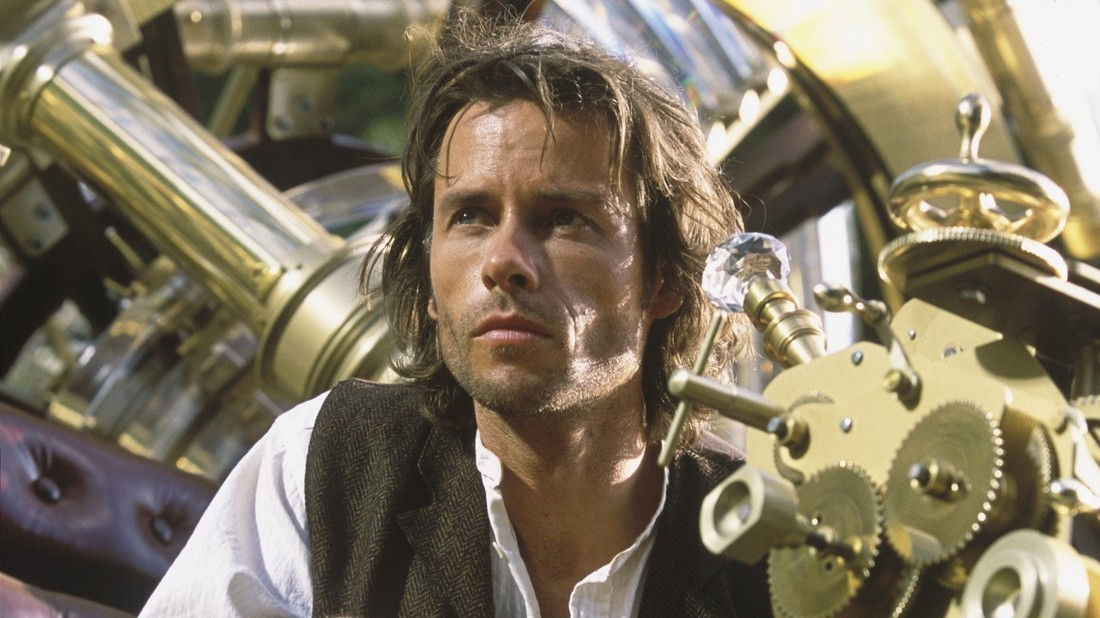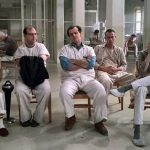“The Time Machine (2002)”

Based on the classic science fiction novel by H.G. Wells, “The Time Machine” (2002) directed by Simon Wells is a modern reimagining that blends elements of adventure, romance, and speculative fiction. Set in both Victorian England and a dystopian future, the film explores themes of time travel, destiny, and the consequences of unchecked scientific progress.
The narrative follows Alexander Hartdegen (played by Guy Pearce), a brilliant scientist and inventor grieving over the tragic death of his fiancée, Emma (played by Sienna Guillory). Obsessed with the concept of time travel, Alexander constructs a time machine in a desperate attempt to change the past and prevent Emma’s death. His journey through time takes unexpected turns, propelling him thousands of years into the future.
Central to “The Time Machine” is its exploration of the implications of time travel. As Alexander navigates through different epochs, from the tranquil beauty of 19th-century New York to the post-apocalyptic wasteland of 802,701 AD, he witnesses the evolution of humanity and the Earth itself. Each era presents distinct challenges and mysteries, forcing Alexander to confront his assumptions about progress, civilization, and the fragility of human existence.

The portrayal of the future in “The Time Machine” is particularly striking. In 802,701 AD, humanity has diverged into two distinct species: the peaceful Eloi, who live above ground in idyllic simplicity, and the monstrous Morlocks, who dwell underground and prey upon the Eloi. This stark division serves as a commentary on social inequality, industrialization, and the consequences of environmental degradation, reflecting Wells’ original critique of Victorian society.
Thematically, the film explores the notion of fate and the inevitability of certain events. Despite Alexander’s attempts to alter the past and rewrite history, he learns that some events are fixed points in time that cannot be changed. This realization prompts him to grapple with existential questions about free will, choice, and the moral responsibilities of scientific discovery.

At its core, “The Time Machine” is a story of personal growth and redemption. Alexander’s journey through time becomes a quest for understanding and acceptance, as he learns to reconcile his grief and find hope for the future. His evolving relationship with Mara (played by Samantha Mumba), an Eloi woman who becomes his ally and confidante, underscores the film’s exploration of love, loss, and the resilience of the human spirit.
Visually, “The Time Machine” captivates with its imaginative depiction of different time periods and civilizations. The production design and visual effects bring Wells’ vision of the future to life, creating a vivid and immersive world that seamlessly blends historical realism with futuristic speculation. The contrast between the lush, verdant landscapes of the Eloi and the industrial decay of the Morlock underworld enhances the film’s thematic exploration of humanity’s dual nature and the consequences of technological advancement.

The film’s pacing and action sequences, including Alexander’s encounters with the Morlocks and his desperate race against time to save the Eloi from extinction, contribute to its thrilling narrative arc. Each confrontation and revelation adds depth to Alexander’s character development, highlighting his transformation from a grief-stricken scientist into a courageous hero willing to confront the mysteries of time and space.
In conclusion, “The Time Machine” (2002) stands as a thought-provoking and visually stunning adaptation of H.G. Wells’ classic novel. Through its exploration of time travel, social commentary, and existential themes, the film invites viewers on a mesmerizing journey through past, present, and future. With its compelling narrative, compelling performances, and evocative visuals, “The Time Machine” continues to resonate with audiences as a timeless tale of adventure, discovery, and the enduring quest for meaning in an ever-changing world.











